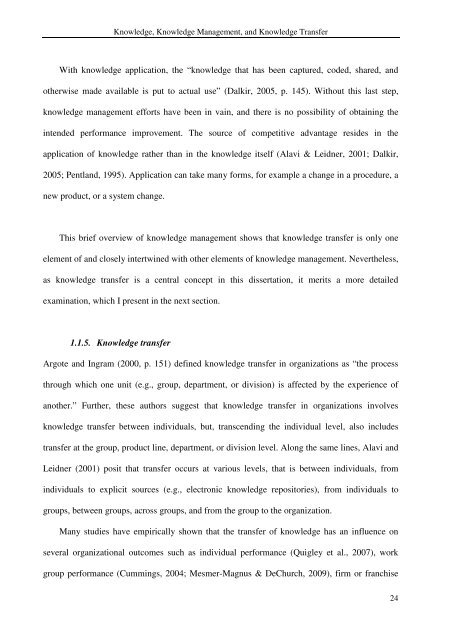thesis_Daniela Noethen_print final - Jacobs University
thesis_Daniela Noethen_print final - Jacobs University
thesis_Daniela Noethen_print final - Jacobs University
Create successful ePaper yourself
Turn your PDF publications into a flip-book with our unique Google optimized e-Paper software.
Knowledge, Knowledge Management, and Knowledge Transfer<br />
With knowledge application, the “knowledge that has been captured, coded, shared, and<br />
otherwise made available is put to actual use” (Dalkir, 2005, p. 145). Without this last step,<br />
knowledge management efforts have been in vain, and there is no possibility of obtaining the<br />
intended performance improvement. The source of competitive advantage resides in the<br />
application of knowledge rather than in the knowledge itself (Alavi & Leidner, 2001; Dalkir,<br />
2005; Pentland, 1995). Application can take many forms, for example a change in a procedure, a<br />
new product, or a system change.<br />
This brief overview of knowledge management shows that knowledge transfer is only one<br />
element of and closely intertwined with other elements of knowledge management. Nevertheless,<br />
as knowledge transfer is a central concept in this dissertation, it merits a more detailed<br />
examination, which I present in the next section.<br />
1.1.5. Knowledge transfer<br />
Argote and Ingram (2000, p. 151) defined knowledge transfer in organizations as “the process<br />
through which one unit (e.g., group, department, or division) is affected by the experience of<br />
another.” Further, these authors suggest that knowledge transfer in organizations involves<br />
knowledge transfer between individuals, but, transcending the individual level, also includes<br />
transfer at the group, product line, department, or division level. Along the same lines, Alavi and<br />
Leidner (2001) posit that transfer occurs at various levels, that is between individuals, from<br />
individuals to explicit sources (e.g., electronic knowledge repositories), from individuals to<br />
groups, between groups, across groups, and from the group to the organization.<br />
Many studies have empirically shown that the transfer of knowledge has an influence on<br />
several organizational outcomes such as individual performance (Quigley et al., 2007), work<br />
group performance (Cummings, 2004; Mesmer-Magnus & DeChurch, 2009), firm or franchise<br />
24

















